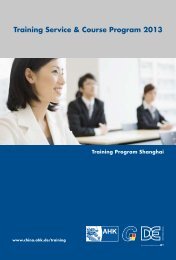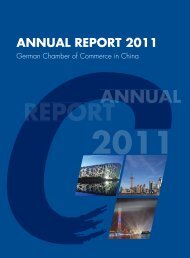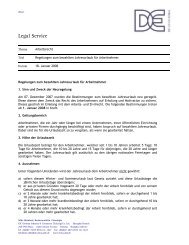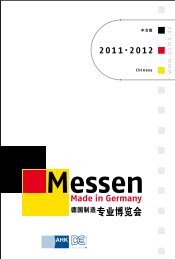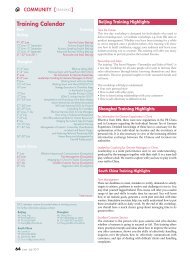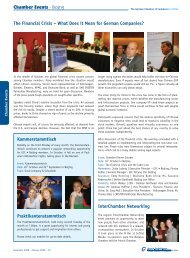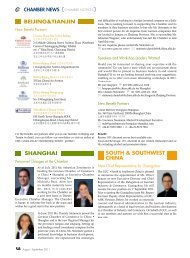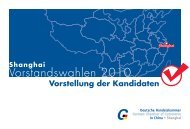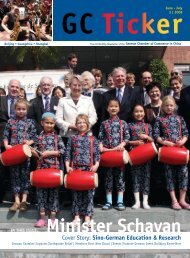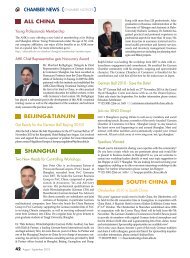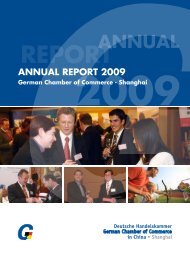Minister Steinmeier - AHKs
Minister Steinmeier - AHKs
Minister Steinmeier - AHKs
You also want an ePaper? Increase the reach of your titles
YUMPU automatically turns print PDFs into web optimized ePapers that Google loves.
Beijing • Guangzhou • Shanghai<br />
IN THIS ISSUE:<br />
August - September<br />
2008<br />
<strong>Minister</strong> <strong>Steinmeier</strong><br />
Cover Story: Sino-German Relations<br />
Female Managers in China| Chamber Gears up for the Games| Taiwan Night Markets Unqiue Experience
With an optimized, strategic business alignment and<br />
a persuasive, creative appearance, we will give your brand<br />
a competitive edge that will ensure lasting profit growth.<br />
With expertise and a personal touch, Montfort Werbung<br />
will support you in all areas of successful brand leadership –<br />
in the US, Europe and Asia.<br />
MONTFORT SHANGHAI<br />
Yeeeeeeeeeeeeha!<br />
SHANGHAI (CN) · KLAUS (A) · RUGGELL (FL) · CHICAGO (USA)<br />
Room 1101, 555 Nanjing West Road, 200041 Shanghai<br />
Contact person: Oliver Lorenz, B2B@montfortshanghai.com<br />
Tel. +86 (0) 21 / 52 13 66 00 - 800
GCC Board<br />
Beijing<br />
* All-China Board member<br />
August - September 2008 | 2<br />
Siemens Ltd. China<br />
President and CEO<br />
Dr. Richard Hausmann *<br />
Chairman<br />
KPMG Huazhen Certified Public<br />
Accountants<br />
Partner Audit<br />
Mr. Andreas Feege<br />
Treasurer<br />
Lufthansa German Airlines<br />
Chief Representative for China<br />
Mr. Gregor Wende<br />
German National<br />
Representative to the EUCCC<br />
German Chamber Beijing<br />
Executive Director<br />
Ms. Jutta Ludwig *<br />
Delegate & Chief Representative<br />
Delegation of German Industry<br />
& Commerce Beijing<br />
Deutsche Bank (China) Co. Ltd.<br />
Beijing Branch<br />
Director, Head of Corporate Banking<br />
Coverage, China<br />
Mr. Eddy Henning<br />
Gruner+Jahr (Beijing)<br />
Advertising Co. Ltd.<br />
General Manager & President<br />
Mr. Wolfgang Kohl<br />
Volkswagen (China)<br />
Investment Co. Ltd.<br />
Executive Vice President,<br />
Finance Department<br />
Dr. Jörg Mull<br />
Bayer (China) Ltd.<br />
Vice President, Corporate Social<br />
Responsibility Greater China<br />
Mr. William Valentino<br />
Daimler Northeast Asia Ltd.<br />
Chairman & CEO<br />
Mr. Ulrich Walker<br />
Shanghai Guangzhou<br />
Lufthansa German Airlines<br />
Managing Director Greater China<br />
Mr. Arved von zur Mühlen *<br />
Chairman<br />
Bosch (China) Investment Ltd.<br />
Executive Vice President<br />
Mr. Elmar E. Weitzel<br />
Vice Chairman<br />
Vossloh Fastening Systems<br />
(China) Co. Ltd.<br />
CEO<br />
Mr. Thomas Dorn<br />
Treasurer<br />
German Chamber Shanghai<br />
Executive Director<br />
Mr. Manfred Rothgänger *<br />
Delegate & Chief Representative<br />
Delegation of German Industry<br />
& Commerce Shanghai<br />
Beiten Burkhardt Rechtsanwaltgesellschaft<br />
mbH<br />
Shanghai Representative<br />
Office<br />
Chief Representative<br />
Mr. Rainer Burkardt<br />
Siemens Shanghai Medical<br />
Equipment Ltd.<br />
President and CEO<br />
Dr. Rolf Hupke<br />
POLYMAX (Shanghai) Trading<br />
Co. Ltd.<br />
Chairman of the Board<br />
Mr. Ulrich Mäder<br />
Allianz China Life Insurance<br />
Co. Ltd.<br />
CEO<br />
Mr. Christian Molt<br />
Management Engineers<br />
China Ltd.<br />
Managing Director<br />
Ms. Brigitte Wolff<br />
The German Chamber of Commerce in China<br />
Trolli Confectionery Co. Ltd.<br />
Guangzhou<br />
General Manager<br />
Mr. Michael Stein *<br />
Chairman<br />
German Chamber Guangzhou<br />
Executive Director<br />
Ms. Alexandra Voss *<br />
Delegate & Chief Representative<br />
Delegation of German Industry &<br />
Commerce Guangzhou<br />
Lufthansa German Airlines<br />
Guangzhou<br />
General Manager, Southern China<br />
Mr. Nico Beilharz<br />
TCA Ltd. The Cable Assembler<br />
Dongguan<br />
CEO / President<br />
Mr. Frank Jaeger<br />
VA TECH ELIN Transformer<br />
Guangzhou Co. Ltd. (Siemens<br />
Group)<br />
General Manager<br />
Mr. Dirk Soete<br />
C. Melchers GmbH & Co. KG<br />
Guangzhou & Chongqing<br />
Representative Offices<br />
Inspirion GmbH Guangzhou<br />
Representative Office<br />
Chief Representative<br />
Ms. Renate Tietjen
The German Chamber of Commerce in China<br />
www.china.ahk.de 3 | August - September 2008
Preface<br />
The GC Ticker is the internal bi-monthly newsletter<br />
of the German Chamber of Commerce in China.<br />
Publisher<br />
German Chamber of Commerce in China<br />
Managing Editor<br />
Ms. Kristen Robinson (Shanghai)<br />
Editorial Team<br />
Mr. Walter Jansen (Beijing)<br />
Mr. Kilian Becker (Guangzhou)<br />
GC Ticker is free of charge. For subscription or<br />
extra copies please email your nearest Chamber<br />
office<br />
Germany at the Games special supplement<br />
edited by GCC • Beijng<br />
Other issues of the magazine can be found on<br />
our website: www.china.ahk.de/publications<br />
For editorial or sponsorship inquiries please<br />
contact:<br />
German Chamber of Commerce in China<br />
Beijing Office<br />
German Chamber of Commerce<br />
in China • Beijing<br />
0811 Landmark Tower 2, 8 Dongsanhuan (N) Rd.<br />
Chaoyang, Beijing 100004<br />
Tel: +86-10-6590 0926 ext. 308<br />
Fax: +86-10-6590 6313<br />
Email: jansen.walter@bj.china.ahk.de<br />
Guangzhou Office<br />
German Chamber of Commerce<br />
in China • Guangzhou<br />
2915 Metro Plaza, Tianhe (N) Rd.<br />
Guangzhou 510620<br />
Tel: +86-20-8755 2353<br />
DL: +86-20-8755 8203<br />
Fax: +86-20-8755 1889<br />
Email: becker.kilian@gz.china.ahk.de<br />
Shanghai Office<br />
German Chamber of Commerce<br />
in China • Shanghai<br />
29F, POS Plaza, 1600 Century Ave.<br />
Pudong, Shanghai 200122<br />
Tel: +86-21-5081 2266, ext. 1637<br />
Fax: +86-21-5081 2009<br />
Email: robinson.kristen@sh.china.ahk.de<br />
© 2007-2008. German Chamber of Commerce in China.<br />
No part of this publication may be reproduced without<br />
the publisher’s prior permission. While every effort has<br />
been made to ensure accuracy, the publisher is not responsible<br />
for any errors. Views expressed are not necessarily<br />
those of GIC/GCC.<br />
August - September 2008 | 4<br />
The Games Are Here!<br />
Dear Reader,<br />
After years of anticipation, the Beijing<br />
2008 Olympic Games and Paralympic Games<br />
are here. They will have lasting significance<br />
for China’s further domestic development<br />
and its global presence. Numerous German<br />
companies have participated in providing<br />
solutions for China’s Olympic preparations<br />
that will make long term improvements in<br />
infrastructure, transportation, environmental<br />
protection, the efficient use of energy<br />
and sustainable urban development. These<br />
projects will serve as models for development<br />
throughout China in the coming<br />
years, and will not only improve the lives of<br />
the Chinese people, but also the well-being<br />
of billions around the globe, as the air and<br />
water become cleaner and fewer resources<br />
are used.<br />
German Vice-Chancellor Frank Walter <strong>Steinmeier</strong>’s<br />
opening of the Chongqing Dialogue<br />
on Urbanization in June was a symbol<br />
of the importance Germany attaches to<br />
these developments. Under the umbrella<br />
of Germany and China – Moving Ahead<br />
Together, the urbanization conference was<br />
the first in a number of similar dialogues<br />
on sustainability planned for other cities<br />
around China.<br />
Well-equipped with the German Chamber’s<br />
Beijing 2008 Pocket Guide, visitors from<br />
overseas and across China are streaming<br />
to Beijing and the other host cities to<br />
enjoy the feeling of sporting competition,<br />
see the sights and soak up the culture.<br />
Created by the German Chamber of Commerce<br />
in China • Beijing in preparation<br />
for the Games, the Guide provides detailed<br />
information about the land and its people.<br />
The German Chamber of Commerce in China<br />
Visitors seem truly stunned by the sights<br />
and the audacious Olympic venues. They<br />
would be even more impressed if they<br />
knew the details of the low voltage power<br />
circuits, rainwater recovery systems, solar<br />
power generation, special reflective coatings,<br />
transportation, medical and lighting<br />
systems, and, yes, the artwork that<br />
Germans have contributed to the Olympic<br />
sites and supporting infrastructure. In the<br />
20 page Olympic Supplement to this issue<br />
of the GC Ticker, we are presenting a sampling<br />
of these activities as well as what’s<br />
hot in sports, how Germans are involved,<br />
and what the Olympics and Paralympics<br />
are all about.<br />
In all of the joy of the Olympics, however,<br />
we must not forget the sorrow of those in<br />
China’s southwest, who experienced the<br />
tragic Sichuan earthquake. We continue to<br />
offer our condolences and are proud of the<br />
significant sum of money raised by our<br />
member companies and their employees,<br />
the generous contributions made by the<br />
German people, and the ambitious plans<br />
to rebuild schools in the affected areas<br />
being coordinated by the German government.<br />
Numerous German companies sent<br />
medical supplies and equipment, water<br />
treatment plants, power supplies, battery<br />
powered lighting, power tools, and food in<br />
the first hour of need. The fully equipped<br />
field hospital provided by Germany surely<br />
promoted the rapid recovery of many.<br />
During this great challenge, the Chinese<br />
people continue to persevere in the true<br />
spirit of Olympians and Paralympians. We<br />
wish China a memorable Olympics and<br />
Sichuan a successful recovery!<br />
Enjoy reading!<br />
Dr. Richard Hausmann<br />
Chairman of the German Chamber of Commerce in China, Beijing<br />
President and CEO of Siemens Ltd. China
The German Chamber of Commerce in China<br />
10<br />
12<br />
14<br />
16<br />
20<br />
26<br />
28<br />
36<br />
38<br />
40<br />
42<br />
Business Focus<br />
Sino-German Dialogue Revived<br />
<strong>Minister</strong> <strong>Steinmeier</strong> and Chinese<br />
officials inject new energy into<br />
bilateral relations<br />
Holding up Half the Sky<br />
Five female German managers share<br />
their experiences working in China<br />
Chinese Market Demands<br />
Fast-Paced Business IQ<br />
Regional Spotlight:<br />
Xi’an - More than History<br />
Changzhou- Small Town Feel,<br />
Big City Plans<br />
Yunnan - Gateway to ASEAN<br />
Chamber News<br />
Beijing<br />
Chamber events highlight<br />
implications of Olympics, and how<br />
they will affect German businesses<br />
Guangzhou<br />
Guangzhou soccer fans cheer on<br />
German team<br />
Shanghai<br />
Chamber members share how they’ve<br />
contributed to Sichuan relief efforts<br />
and welcome more ideas for<br />
long-term reconstruction support<br />
from the German community<br />
Around Town<br />
All China<br />
Beijing<br />
Guangzhou<br />
South China celebrates Dragon Boat<br />
Festival<br />
Shanghai<br />
Soccer fans join together to cheer<br />
on Germany at the European Cup<br />
18<br />
28<br />
64<br />
10<br />
23<br />
40<br />
66<br />
Contents<br />
Members Mix<br />
Meet the Member<br />
Member News<br />
Updates from our member companies:<br />
relocations, new management,<br />
community events and anniversaries<br />
Community<br />
Expo in Brief<br />
Sichuan earthquake survivors visit<br />
Expo site, Shanghai steps up<br />
environmental regulations<br />
Health<br />
Learn how you can reduce<br />
office job back pain<br />
Training Courses<br />
Education<br />
How to attract and retain the right<br />
talent for your company<br />
Environment<br />
Is your office green? Participate in<br />
a free eco-office audit to find out<br />
how you can save the environment<br />
- and office supply costs<br />
Travel<br />
Snacks and bargains make Taiwan’s<br />
night markets attraction for<br />
travelers in Asia<br />
Art, Culture & Books<br />
German films featured at Shanghai<br />
Film Festival, Florian Schilling’s My<br />
Mother’s Tears wins Best<br />
Cinematography<br />
Community Calendar<br />
Competitions<br />
Benefit Program Update<br />
Two new South China partners and<br />
one venue closing in Shanghai<br />
Chamber Events Calendar<br />
Interchamber mixers, a special<br />
environmental seminar,<br />
beer festivals and a visit from<br />
Deutsche Bank’s Prof. Walter keep<br />
the autumn months rolling<br />
www.china.ahk.de 5 | August - September 2008<br />
44<br />
46<br />
60<br />
61<br />
62<br />
63<br />
64<br />
66<br />
68<br />
69<br />
70<br />
71<br />
72
Chamber Teams<br />
Join Our Growing<br />
Network<br />
Now at Half Price<br />
Take advantage of our<br />
comprehensive, Chinawide<br />
network of German compa-<br />
nies. Six month memberships<br />
lasting through December<br />
2008 available at half price.<br />
Contact your local Chamber<br />
for details.<br />
Beijing<br />
Ms. Katrin Loch<br />
010 6590-6930<br />
Email: loch.katrin@bj.china.ahk.de<br />
Guangzhou<br />
Mr. Kilian Becker<br />
020 9755-8203<br />
becker.kilian@gz.china.ahk.de<br />
Shanghai<br />
Ms. Heidrun Buss<br />
021 5081-2266 ext. 1656<br />
buss.heidrun@sh.china.ahk.de<br />
June August - July - September 2008 | 62008<br />
| 6<br />
Beijing<br />
Guangzhou<br />
Shanghai<br />
Ms. Katrin Loch<br />
Executive Chamber Manager<br />
Tel: 010 6590-6930<br />
Email: loch.katrin@bj.china.ahk.de<br />
Ms. Claudia Barkowsky<br />
Regional Manager North China<br />
Tel: 010 6590-0926 ext. 329<br />
Email: barkowsky.claudia@bj.china.ahk.de<br />
Mr. Kilian Becker<br />
Manager Membership & Events<br />
Tel: 020 8755-8203<br />
Fax: 020 8755-1889<br />
Email: becker.kilian@gz.china.ahk.de<br />
Ms. Anna-Lisa Hartmann<br />
Senior Manager Chamber Affairs<br />
Tel: 021 5081-2266 ext. 1630<br />
Fax: 021 5081-2266 ext. 5630<br />
Email: hartmann.anna-lisa@sh.china.ahk.de<br />
Ms. Heidrun Buss<br />
Project & Event Manager Shanghai<br />
Tel: 021 5081-2266 ext. 1656<br />
Fax: 021 5081-2266 ext. 5656<br />
Email: buss.heidrun@sh.china.ahk.de<br />
Ms. Li Yandi<br />
Project Manager<br />
Tel: 021 5081-2266 ext. 1609<br />
Fax: 021 5081-2266 ext. 5609<br />
Email: li.yandi@sh.china.ahk.de<br />
The German Chamber of Commerce in China<br />
Ms. Lina Sun<br />
Chamber Affairs Management<br />
Tel: 010 6590-0926 ext. 210<br />
Email: sun.lina@bj.china.ahk.de<br />
Mr. Walter Jansen<br />
Publications Manager<br />
Tel: 010 6590-0926 ext. 308<br />
Email: jansen.walter@bj.china.ahk.de<br />
Ms. Esther Hu<br />
Chamber Assistant<br />
Tel: 020 8755-2353 ext. 217<br />
Fax: 020 8755-1889<br />
Email: hu.esther@gz.china.ahk.de<br />
Ms. Kristen Robinson<br />
Publications & Marketing Manager<br />
Tel: 021 5081-2266 ext. 1637<br />
Fax: 021 5081-2266 ext. 5637<br />
Email: robinson.kristen@sh.china.ahk.de<br />
Mr. Ferdinand Pillenstein<br />
Regional Manager Zhejiang & Jiangsu Provinces<br />
Tel: 021 5081-2266 ext. 1830<br />
Fax: 021 5081-2266 ext. 5830<br />
Email: pillenstein.ferdinand@sh.china.ahk.de<br />
Ms. Liu Li<br />
Chamber Team Assistant<br />
Tel: 021 5081-2266 ext. 1650<br />
Fax: 021 5081-2266 ext. 5650<br />
Email: liu.li@sh.china.ahk.de
The German Chamber of Commerce in China<br />
Contents<br />
www.china.ahk.de 7 | August - September 2008
Business Focus<br />
Chamber Notices<br />
August - September 2008 | 8<br />
ALL CHINA<br />
Germany Responds to Sichuan<br />
Earthquake<br />
The German Chamber of Commerce in China would like to extend<br />
its gratitude to all member companies who took immediate<br />
action to support the victims of the Sichuan earthquake. Over<br />
the past three months, companies have donated items ranging<br />
from medical supplies and tents to construction equipment and<br />
logistics services.<br />
Estimates put the total of public and private donations from<br />
Germany at over EUR 20m. According to a GCC • China press<br />
release on May 23 rd , German companies in China donated EUR<br />
9m. The German Chamber of Commerce in China donated EUR<br />
100,000 on behalf of its members.<br />
In the near future, the Chamber plans to host a platform for<br />
companies interested in funding a long-term project to find<br />
likeminded partner companies. These groups of companies aim<br />
to coordinate enough funding and manpower to rebuild schools<br />
or urban environments struck by the quake.<br />
GUANGZHOU<br />
New Chairman of the Board<br />
On 29 th May, the board of the German Chamber of Commerce •<br />
Guangzhou elected Mr. Michael Stein, General Manager of Trolli<br />
Confectionery Co. Ltd, as its chairman. Together with Executive<br />
Director Alexandra Voss he will also represent the interests of<br />
GCC • Guangzhou on the All-China Board.<br />
OKTOBERFEST 2008 Guangzhou<br />
16 th -21 st September<br />
New Location<br />
Although the China Hotel – A Marriot Hotel is again the coorganizer,<br />
the 4 th Oktoberfest in Guangzhou will take place in a<br />
new location. Opposite the China Hotel in front of the Jinhan<br />
Centre, the new tent will host more than 3,000 guests during<br />
the event period from 16 th to 21 st September 2008.<br />
New Band<br />
Already established in German-speaking countries as guarantors<br />
of fun and quality, the band Wirbelwind will perform for 6 days<br />
in Guangzhou, presented by GCC • Guangzhou. Don’t miss their<br />
program which includes the traditional duck dance and highly<br />
surprising new show elements never seen before in South China!<br />
The 4 members of the band will be accompanied by 21 year-old<br />
singer Michaela who has recently released her first CD.<br />
New Competition<br />
While the food and the beer will certainly be German, there will<br />
be a rather international competition for the crowning of Miss<br />
Oktoberfest. An “experienced” judging panel will pre-elect the<br />
Top 10, while the audience will make the final call on which<br />
Guangzhou beauty will win the title. Meet and celebrate the<br />
beauties on site in September!<br />
The German Chamber of Commerce in China<br />
German Chamber Opens Office in Tianjin<br />
In May 2008, the German Chamber of Commerce in China, Beijing opened an<br />
office in the city of Tianjin. This important step serves to reinforce the Chamber’s<br />
commitment to the region and provides a base from which to serve the<br />
rising number of Chamber members and monitor the developments in the<br />
region. An official opening ceremony will be held in September 2008.<br />
Ms. Claudia Barkowsky | Email: barkowsky.claudia@bj.china.ahk.de<br />
3 Yuliang Road, Nankai District, Tianjin 300191<br />
OUT NOW: Beijing 2008 Pocket Guide<br />
The Beijing 2008 Pocket Guide will make finding your way in Beijing easier,<br />
no matter whether you are a first time visitor or a Beijing resident. It provides<br />
essential information regarding travel precautions, the Olympic Games, top<br />
sights in Beijing and China and emergency contacts, as well as a listing of frequently<br />
used addresses and a Beijing city map.<br />
Ms. Constanze Boening | Tel: 010 6590-0926 ext. 201<br />
Email: boening.constanze@bj.china.ahk.de<br />
Last Minute Ball Sponsorships Available<br />
Don’t miss out – only a few sponsorship positions for the 8th German Ball in<br />
Beijing are left. The categories are Diamond, Gold, and Silver. Each category<br />
assures your company outstanding exposure and gives you and your employees<br />
significant benefits.<br />
Ms. Lina Sun | Tel: 010 6590-0926 ext. 210 | Email: sun.lina@bj.china.ahk.de<br />
SHANGHAI<br />
Kunshan International Beer Festival<br />
Back by popular demand, GIC Taicang will host a German tent at the 4 th<br />
Kunshan International Beer Festival. Last year’s festival saw 400,000 participants,<br />
and the city of Kunshan expects to welcome even more from around the<br />
world in 2008. Die Emsperlen and Die Schwabenlaedner Musikanten will fly<br />
in from Germany to perform at the German tent. Join us at the German Tent<br />
during the week of 28 th August – 7 th September for authentic German cuisine<br />
and 5 different fresh drafts brewed especially for this annual event.<br />
Mr. Richard Xu | Tel: 021 5081-2266 ext. 1677<br />
Email: xu.hongmin@sh.china.ahk.de<br />
Ms. Christine Schütze | Tel: 021 5081-2266 ext. 1684<br />
Email: schuetze.christine@sh.china.ahk.de | Web: www.china.ahk.de/beerfestival<br />
Shanghai Daily German Supplement<br />
BEIJING<br />
The Shanghai Daily will feature a German Supplement this October in honor of<br />
German National Day. As well as featuring stories about the activities of German<br />
business in Shanghai and China, the supplement will celebrate the 36 th anniversary<br />
of the establishment of diplomatic relations with China. Opportunities to<br />
provide advertising support for Shanghai Daily’s German National Day supplement<br />
are also available.<br />
A feature will be ‘testimonials’ from leading German political and business<br />
figures commenting on why the nation’s involvement in China is important for<br />
both countries. The supplement also will carry a story about German Chamber<br />
of Commerce Shanghai and its activities.
Business Focus<br />
Cover Story<br />
August - September 2008 | 10<br />
The German Chamber of Commerce in China<br />
Sino-German Dialogue Revived<br />
<strong>Steinmeier</strong> and Chinese officials inject new energy into bilateral relations<br />
The Dialogue on Urbanization<br />
© Goethe-Institut Peking / Jiang Ziwei<br />
German Foreign <strong>Minister</strong> Frank Walter <strong>Steinmeier</strong>’s visit to China in mid-<br />
June reignited talks between the two countries. Stopping first in the<br />
capital, the foreign minister moved on to a Yangtze River boat tour,<br />
attended a conference on urbanization in Chongqing and visited the<br />
earthquake zone. During his visit, <strong>Minister</strong> <strong>Steinmeier</strong> covered topics<br />
ranging from business transparency to urbanization. Officials on both<br />
sides approached bilateral talks with a newfound enthusiasm and open,<br />
frank attitude.<br />
Officials Talk Policy Substance in Beijing<br />
In Beijing, <strong>Minister</strong> <strong>Steinmeier</strong>’s visit included meetings with Chinese<br />
Premier Wen Jiabao and the State Council’s highest-ranking foreign<br />
policy official, Dai Binguo. Premier Wen spent nearly twenty minutes<br />
detailing China’s effort to create transparent conditions for foreign business;<br />
in its legal framework, in intellectual property protection and in<br />
the ongoing opening of the country - efforts which the German foreign<br />
minister acknowledged gratefully later that day.<br />
Lengthy talks with China’s Foreign <strong>Minister</strong> Yang Jiechi resulted in the<br />
fundamental recognition that the Sino-German relationship is of great<br />
importance. Calling the enhancement of bilateral relations “a top-priority<br />
item for both the Chinese and German governments” after the<br />
meetings, <strong>Minister</strong> Yang reinforced <strong>Minister</strong> <strong>Steinmeier</strong>’s assessment<br />
that future Sino-German dialogue would be “broad and resilient.” This<br />
improved outlook will allow both parties to handle issues such as visa<br />
requirements and perspectives on the Dalai Lama effectively.<br />
The Sino-German Strategic Dialogue at the Vice-<strong>Minister</strong>ial level on<br />
security and economic questions, and the Human Rights Talks will be<br />
resumed in the second half of 2008. Furthermore, the talks will be<br />
enhanced with new areas of discussion including climate change and<br />
cooperation on crisis spots in Africa.<br />
Implications for Global Policy<br />
<strong>Minister</strong> <strong>Steinmeier</strong> used his stay in Beijing to address broader foreign<br />
policy ideas on a global level. He coined the expression “Verantwor-<br />
tungspartnerschaft” (partnership in shouldering global responsibility)<br />
to characterize his view of future Sino-German relations concerning the<br />
environment, and political and economic issues associated with it.<br />
In a global foreign policy statement, <strong>Steinmeier</strong> called upon global<br />
powers to “re-measure the world.” He stated that upon doing so, it<br />
would become apparent that the formation of new economic and political<br />
blocks to replace the old would be counterproductive.<br />
He stressed the need for government and society everywhere to be “open<br />
and willing to modernize.” Such openness also entails “open dialogue<br />
between government and society, including the capacity for criticism,”<br />
although he warned that dialogue consisting only of criticism would<br />
quickly turn stale.<br />
Foreign <strong>Minister</strong> Consults Community Leaders<br />
In addition to talks with political leaders, <strong>Minister</strong> <strong>Steinmeier</strong> met<br />
several groups of the Beijing community. At a breakfast held at the<br />
German Embassy, he discussed various issues with 5 civilian leaders<br />
ranging from a university professor to a human rights lawyer. He fielded<br />
tough questions from students on capitalism, democracy, the depiction<br />
of China in the German media, and even the German chancellor herself<br />
at the China Foreign Affairs University.<br />
Finally, he attended the opening of two German art exhibits in Beijing.<br />
The exhibits represent the largest cooperation between German and<br />
Chinese museums ever – the ‘Gerhard Richter’ and ‘Living Landscapes’<br />
exhibits at the National Art Museum of China (NAMOC). His discussions<br />
with community members aim to foster promising ties between the<br />
people of China and Germany on a social and cultural level.<br />
Chongqing Events Continue Candid Discourse<br />
In Chongqing, often dubbed the world’s largest municipality, the<br />
frank manner demonstrated in Beijing was continued during meetings<br />
between Secretary Bo Xilai and <strong>Minister</strong> <strong>Steinmeier</strong>. The two-day conference<br />
in Chongqing not only underlined the city’s role as a model for
The German Chamber of Commerce in China<br />
urban development, but also showed that cooperation between Chinese<br />
and German institutions, companies, universities and government entities<br />
is already well underway. <strong>Minister</strong> <strong>Steinmeier</strong> opened the ‘Chongqing<br />
Dialogue on Urbanization,’ a major event of the “Germany and China –<br />
Moving Ahead Together” series.<br />
During the events, former German Federal <strong>Minister</strong> Klaus Töpfer gave<br />
an insightful speech honoring Chongqing as the municipality that had<br />
brought industrialization to West China. However, industrialization<br />
brings both economic progress and environmental challenges with it.<br />
<strong>Steinmeier</strong>’s opening remarks analyzed the way in which the expressions<br />
“mega cities” and “urbanization” are often code words for problems<br />
rather than solutions. He stressed that in cases such as Chongqing,<br />
“urbanization becomes globalization under a magnifying glass.” Accordingly,<br />
global cooperation becomes vital to confront the challenges of<br />
urbanization.<br />
<strong>Steinmeier</strong> mentioned substantial investments from German companies<br />
in the region and indicated his willingness to accept Germany’s<br />
support in urban planning, calling it beneficial for the creation of “a<br />
livable environment for the people.” 50% of the municipality’s surface<br />
area is to become green. This advancement reflects the ideas of Prof.<br />
Ümüt Halik (Xinjiang University) who showed - based on the example of<br />
Urumqi - that regarding a city as an ecological system is a rather new<br />
but life-saving approach in our fast developing world.<br />
Mr. Martin Brudermüller (BASF) began the panel on “Visionary Long-<br />
Term Planning” by underlining the responsibility of urban planners,<br />
architects and designers to take environmental sustainability into consideration.<br />
In a later keynote, the German Chamber of Commerce in<br />
China • Beijing’s Jutta Ludwig pursued a complementary theme, arguing<br />
that private companies influenced the urban scene more than any other<br />
stakeholder with their decisions on location, staff and production facilities<br />
capacity. Enterprises must take responsibility, she said.<br />
Resource Management Plays a Key Role<br />
Focusing on the topic of urbanization, <strong>Minister</strong> <strong>Steinmeier</strong> acknowledged<br />
that responsible handling of resources is the job of both governments<br />
and companies. He specifically highlighted the importance of<br />
energy efficiency and water management.<br />
During the “Energy Efficiency and Transport” panel, Ulrich Walker (Daimler<br />
Northeast Asia) drew attention to the decreasing availability of resources<br />
at a time when the world’s population, and therefore demand for<br />
resources, is increasing. Panelists discussed possible solutions. Increasing<br />
fuel prices and providing energy-efficient vehicles was one strategy<br />
Jutta Ludwig in Chongqing<br />
© Goethe-Institut Peking/Jiang Ziwei<br />
proposed by Dr. Peter Kilgenstein (Bosch). Such efforts can be complesmented<br />
by the use of biodiesel and hydrogen-powered cars in future, as<br />
noted by Ren Xiaozhang (China Automotive Engineering Institute).<br />
The very nature of transportation networks is also not to be forgotten,<br />
as they play a key role in energy consumption rates. Dirk Hoke (Siemens)<br />
and Professor Shao Yiming (Traffic & Transport Institute of Chongqing<br />
Jiaotong University) pointed to better traffic and transport management,<br />
and advocated improving railway transport with an energy-saving<br />
mobility model.<br />
In another panel, “Environment and Water Protection”, moderator<br />
Claudia Wanner, (Financial Times Germany), involved the audience<br />
in a controversial discussion on the 4-action-plan (blue sky, green<br />
water, green land, serenity) introduced by Prof. Xu Zhonghua (Chongqing<br />
Water Resources Programming & Planning Institute). Participants<br />
debated various methods of implementing environmental protection<br />
programs. Dr. Roland Winkler (econet china), Prof. He Qiang (CQ Municipal<br />
Government Committee) and Nicolas Zuber (Herrenknecht) presented<br />
energy efficient alternatives like sustainable building technology,<br />
water transfer and urban planning schemes which integrate water<br />
supply sources.<br />
<strong>Steinmeier</strong> Visits Earthquake Epicenter<br />
<strong>Steinmeier</strong> praised the truly open and rapid manner in which the Chinese<br />
government handled the Sichuan earthquake, calling it a sign of “the<br />
true greatness of the Chinese nation.” Bo Xilai thanked Germany in his<br />
opening speech for the generous donations after the earthquake as well.<br />
Certainly German investment and know-how in infrastructure building<br />
will play an important role in the reconstruction of the earthquake zone.<br />
After offering the German people’s condolences for the victim’s of the<br />
disastrous earthquake again, <strong>Minister</strong> <strong>Steinmeier</strong> announced a German<br />
project which will construct 8 lighthouse schools in Dujiangyan, the<br />
hardest-hit area. German companies such as Bosch, ThyssenKrupp, BASF<br />
and Herrenknecht will take part along with the German government.<br />
Partner schools in Germany have already offered their patronage to<br />
these lighthouse schools, which are to offer safety of construction, topflight<br />
equipment, academic excellence and German language instruction.<br />
Before concluding his trip near the Sichuan earthquake’s epicenter, <strong>Steinmeier</strong><br />
also visited a field hospital donated by the German Red Cross, and a<br />
site where workers of the German Technisches Hilfswerk were laboring to<br />
restore clean water to victims. Germany continues to support the reconstruction<br />
of the earthquake zone, and hopes that by working together the<br />
process can move forward as quickly as possible.<br />
<strong>Minister</strong> <strong>Steinmeier</strong>, Ambassador Schaefer and Ms. Gudrun<br />
Krögel-Schaefer <strong>Minister</strong> Yang, <strong>Minister</strong> <strong>Steinmeier</strong>, Dr. Roth<br />
Cover Story<br />
www.china.ahk.de 11 | August - September 2008<br />
Business Focus
Business Focus<br />
Sino - German Business<br />
Holding up<br />
Half the Sky<br />
Female Managers in China<br />
Chinese tradition promotes equality, including<br />
gender equality. Chairman Mao himself<br />
noted, “women hold up half the sky,”<br />
emphasizing the importance of their contribution<br />
to society. Leading business magazines<br />
including Time, Fortune and The Wall<br />
Street Journal have reported difficulty for<br />
female expat managers in China. In general,<br />
fewer expat women than men are working in<br />
China. Many of the women working here are<br />
younger or do not have children, most likely<br />
because of the concerns and challenges<br />
presented by moving overseas.<br />
However, due to the convenience of having<br />
an ayi and the family-friendly nature of<br />
Chinese culture, many expat women find a<br />
stay in China to be comfortable once they’ve<br />
arrived. The managers GC Ticker interviewed<br />
all find the environment in China to be more<br />
favorable for and respectful of female managers<br />
than many studies have demonstrated.<br />
Expat women in China even tend to look<br />
at their Chinese counterparts with a bit of<br />
envy. More Chinese women study subjects<br />
which are traditionally male-dominated,<br />
such as physics, engineering and machinery<br />
where the gender ratio is much closer to<br />
50:50. While programs exist to do the same<br />
in Germany, societal constraints have not<br />
yet been overcome. More Chinese women are<br />
able to stay in the workforce due to childcare<br />
infrastructure, not to mention they only have<br />
one child. This greatly affects the amount<br />
of time they need to take off from building<br />
their career compared with Germans.<br />
Despite the increased presence of women<br />
in these fields, these gains do not translate<br />
into increases in income. According to the<br />
World Economic Forum 2007 survey, Chinese<br />
women make roughly 66% as much as<br />
Chinese men in the same field, while German<br />
women earn 76% of the salary their male<br />
counterparts take home.<br />
What challenges remain for both expat and<br />
local women in China? Five female senior<br />
managers of German companies share their<br />
experiences and opinions on the advancement<br />
of women in China.<br />
August - September 2008 | 12<br />
Terese Bareth<br />
CEO & Principal Consultant<br />
Bareth Management Consultants<br />
In 1982, Terese<br />
Bareth began<br />
taking Chinese<br />
courses, which<br />
brought her to<br />
Beijing for study<br />
from 1986-1989.<br />
Upon graduation,<br />
she returned to<br />
China as Manager<br />
of Controlling and Company Development<br />
for a major German automotive supplier.<br />
Afterwards, she founded her own consulting<br />
company in Shanghai.<br />
When asked about her experience in China,<br />
Bareth commented: “I feel like a human<br />
being here, with equal rights and opportunities<br />
and this is a great feeling.” She finds less<br />
gender discrimination here than in Germany,<br />
citing the high numbers of women studying<br />
machinery or physics in China. “It’s easier<br />
here for professional women, grandparents<br />
are willing to take care of the children. In<br />
Germany, grandparents are more independent<br />
so they are willing to help on occasion, but<br />
not every day.”<br />
Chinese women generally also receive much<br />
more equal treatment in the workplace<br />
when compared to Germany in her opinion.<br />
However, promotions can be problematic<br />
when a woman is promoted above her male<br />
peers. However, she notes this happens in<br />
many situations when one employee receives<br />
a promotion, not only because of gender. Over<br />
the past 20 years, Bareth has noticed a lot of<br />
very positive changes. Now, Chinese women<br />
can go anywhere, the world is open for them.<br />
In major cities, some can decide to have a<br />
career instead of children, and although still<br />
rare, Chinese parents and husbands are slowly<br />
beginning to accept this.<br />
The biggest challenge Bareth sees for women<br />
managers in China is for Chinese female<br />
managers working in global companies.<br />
While they may achieve high-ranking positions<br />
here, it is very difficult for them to be<br />
sent to Europe or North America as a female<br />
Asian manager. This puts a limit on their<br />
advancement in a company headquartered<br />
in Germany. A second challenge is the wage<br />
gap. A former manager once remarked to her,<br />
“Hire a woman who will work harder than two<br />
men for half the price.”<br />
The German Chamber of Commerce in China<br />
Katrin Braun<br />
Managing Director, Asia<br />
Machwürth Team International (MTI)<br />
Katrin Braun took<br />
advantage of her<br />
electrical engineering<br />
background to<br />
climb the career<br />
ladder at Siemens<br />
in Germany before<br />
moving to China<br />
three years ago.<br />
She pushed for the<br />
change after experiencing the rewarding work<br />
climate on business trips. She acknowledges<br />
that for most women who already have or are<br />
planning to have families, working abroad<br />
proves difficult. However, the support of her<br />
husband and their two children made the move<br />
possible.<br />
After her subsidiary was sold, she decided to<br />
take up Mandarin study and considered starting<br />
her own business. During her transition, former<br />
colleagues referred her to her current position at<br />
MTI. The opportunity came at the right time, as<br />
services are expanding in MTI’s realm of organizational<br />
development.<br />
When asked about how she perceives gender<br />
relations here in China, she remarked that the<br />
situation is more relaxed than in many Western<br />
countries. Professionally, women have much more<br />
say than in Germany, and are equally respected<br />
by male colleagues. However, the private vs. professional<br />
spheres contrast each other greatly.<br />
In the household, Chinese women still run the<br />
show, playing the role of executive by day and<br />
homemaker by night.<br />
As far as management strategy is concerned,<br />
Braun doesn’t feel as though she had to adjust<br />
her plans to consider potential gender conflicts.<br />
Instead, she was able to focus more strongly on<br />
the barriers created by linguistic and cultural<br />
differences. She emphasizes, “In China, you<br />
have to check progress more often, and give<br />
positive feedback. Many German managers give<br />
negative feedback without positive reinforcement,<br />
but in China you need to consider that<br />
professional relationships are much more<br />
personal.”<br />
Compared to German women, Braun notes that<br />
Chinese women have several advantages. Chinese<br />
women only have one child, and ayis and grandparents<br />
help. As a result, Chinese women continue<br />
working, and don’t lose the 5 to 10 years<br />
that German women do when having children.
The German Chamber of Commerce in China<br />
Britta Ingenwepelt<br />
General Manager<br />
GEZE Industries (Tianjin) Co. Ltd.<br />
Britta Ingenwepelt’s<br />
father<br />
always wanted<br />
her to be an<br />
engineer. She<br />
found the profession<br />
suited both<br />
her temperament<br />
and interests. In<br />
China, she says,<br />
customers often first shake hands with a<br />
male staff member travelling with her, but<br />
she attributes this more to her youth than<br />
her sex. All in all, she adds, being a woman<br />
in the manufacturing industry has drawn<br />
greater attention to her, and that has been<br />
an advantage. The one thing she doesn’t<br />
regularly do here in China however, is the<br />
dinner and karaoke circuit. Quite often, she<br />
says, she isn’t even asked to join, while male<br />
employees are. As a German, she would have<br />
no problem with a beer or two at dinner<br />
time, she argues. In the end, not being a<br />
part of the ‘smoker’s club’ doesn’t hurt her,<br />
though.<br />
When sent to China by GEZE, Ingenwepelt<br />
recalls, there was a single General<br />
Manager handling everything. Then business<br />
expanded rapidly, so the position was<br />
divided. To her surprise, she was immediately<br />
recommended for the GM Production<br />
position. As she had already established<br />
credibility with her colleagues at work,<br />
there was no question about their accepting<br />
her ideas or directives.<br />
Soft spoken, but precise, Ingenwepelt says<br />
that China requires a more emotional leadership<br />
style. “At your wedding in Germany,<br />
perhaps 3% of your guests will be from<br />
work. In China, it’s 80%,” she says. This<br />
may be an advantage for women. Additionally,<br />
the help of ayis, grandparents and<br />
drivers help working moms have more free<br />
time.<br />
Asked for a further comparison, she found<br />
both production and sales culture to be<br />
very similar, and China to be much more<br />
open than expected. One telltale sign that<br />
China offers true quality of life reveals<br />
itself at the spa: men are assigned a masseuse,<br />
and ladies are assigned a handsome<br />
masseur. Sometimes, it’s not hard to be a<br />
woman.<br />
Michaela Stolz-Schmitz<br />
Vice President of Siemens Ltd. China<br />
Director of Corporate Marketing and<br />
the 2008 Projects Department<br />
Michaela Stolz-<br />
Schmitz first came<br />
to China nearly 15<br />
years ago as the<br />
Chief Representative<br />
of a German<br />
specialty steel<br />
manufacturer.<br />
Having studied<br />
economics, political<br />
science and sinology, she was prepared<br />
for China’s culture. Years as an international<br />
journalist (Süd-West Funk, ARD) made her<br />
aware of political and economic issues in<br />
Asia.<br />
She says there are more women in the ranks<br />
of the technical professions in China, even at<br />
higher levels. This helped her to gain acceptance<br />
with clients. As for gaining acceptance<br />
with employees, Stolz-Schmitz maintains<br />
that in China success very much depends<br />
on a manager’s ability to be better than the<br />
team, to further the team’s learning and to<br />
enable the team to win. However, it also<br />
depends on the ability to take an interest in<br />
individuals, strengthening their relationship<br />
with both the team and company by showing<br />
concern for their personal and professional<br />
well-being. While the ability to do this isn’t<br />
necessarily male or female, it is important to<br />
success. Perhaps women, she says, are quite<br />
adept at feeling the pulse of a team.<br />
From her first position, Stolz-Schmitz moved<br />
through the founding of a JV in steel, and a<br />
Chief Representative position in the medtech<br />
field, which led her to her appointment at<br />
Siemens. Returning to China in her current<br />
position at corporate marketing, she also<br />
took charge of the ‘2008 Project Office’ in<br />
2005. It aimed to support the many projects<br />
China was planning to execute for the big<br />
event in 2008. In all, Siemens gained more<br />
than EUR 1bn in business. As a great contributor<br />
to this success, Stolz-Schmitz seems<br />
to be a textbook case of the talented executive<br />
for whom China is a significant part of<br />
an international career.<br />
At Siemens China, by the way, the malefemale<br />
ratio is 63:37 overall, and 69:31 at<br />
the management level, a fact Michaela feels<br />
makes her proud.<br />
Sino - German Business<br />
Ms. Renate Tietjen<br />
Chief Representative<br />
C. Melchers GmbH & Co. KG<br />
Guangzhou & Chongqing<br />
Ms. Renate Tietjen has<br />
been working in China<br />
for C. Melchers GmbH<br />
& Co. KG since 1997.<br />
Additionally, she is<br />
active as a long-term<br />
GCC • Guangzhou board<br />
member and the organizer<br />
of Women in Business<br />
in Guangzhou.<br />
When asked “Why China?” she responded: “By<br />
accident I learned about the university program<br />
in my hometown “Economics & Chinese” and<br />
within 2 weeks I was enrolled. Afterwards<br />
C. Melchers GmbH & Co. KG offered me the<br />
position of Purchase Manager in Shanghai.<br />
The Melchers Group sponsors the Economics/<br />
Chinese faculty at Bremen University and over<br />
the years they have employed many female<br />
graduates in their overseas branches.”<br />
Tietjen feels that not only a stay in Asia but<br />
even frequent business trips here are beneficial<br />
to career development. She has noticed many<br />
female managers in high positions in US MNCs<br />
in the Pearl River Delta, but only a handful of<br />
German female managers are in the region. “In<br />
general, I believe that an increasing number of<br />
women - if given the opportunity - will consider<br />
an overseas stay more seriously. The question<br />
is how many will really commit themselves and<br />
head out,” she said.<br />
Based on her experience, there is more<br />
gender equality in the workplace here than<br />
in Germany. “Indeed it surprised me that<br />
the Chinese are not as gender minded as<br />
Germans…women do hold up half the sky. I<br />
am fully accepted in my position as a female<br />
Chief Representative…for German female managers<br />
the greatest challenge [in China] is to<br />
prove to their German counterparts that they<br />
are just as capable as men.”<br />
GC Ticker asked Tietjen if she had a particular<br />
female entrepreneur she admired. The answer:<br />
Anita Roddick, Founder of The Body Shop.<br />
“Against all odds and far earlier than all other<br />
cosmetic companies she stressed environmental<br />
protection and no animal testing but still<br />
managed to establish a world-wide renowned<br />
brand and company.”<br />
www.china.ahk.de 13 | August - September 2008<br />
Business Focus
Business Focus<br />
Sino - German Business<br />
Good advice is often simple and succinct. But how<br />
simple is the above quote? While the majority of<br />
companies value the wisdom of a phrase like this,<br />
how many are equipped to realize it?<br />
The China Potential<br />
Beyond the media coverage of phenomenal GDP growth rates and consistently<br />
bright economic prospects, managers are faced with a challenging<br />
set of business decisions. What sets the success stories apart<br />
from the failures is the extent to which these decisions are informed<br />
by detailed, reliable, accurate and timely research. How does a<br />
company get that competitive edge?<br />
Requests for business intelligence are steadily on the rise globally.<br />
China is a competitive business environment, with many international<br />
companies having now operated here for a number of decades. The<br />
importance of the market means companies are under pressure to get<br />
things right early and to hit aggressive sales and business growth<br />
targets. This means making informed business decisions quickly. Managers<br />
need market mapping, deep understanding of supply chains, and<br />
knowledge of where the decisions are made and who controls what<br />
and where. Industry research or business intelligence is a first step.<br />
From a global perspective, Fortune 500 companies are already monitoring<br />
the moves of China’s successful domestic companies and the<br />
techniques for tracking those moves need to become increasingly<br />
sophisticated. There is great value for smaller companies too,<br />
especially in terms of being ahead of your competitors. Take the<br />
example of the road safety equipment manufacturer, who discovered<br />
through market intelligence that a competitor had already<br />
registered their trademark for a similar product range in China.<br />
Primary research methods and an analysis of the competitor’s<br />
company finance information, helped to establish that the competitor<br />
planned to expand into overseas markets. Obviously, the<br />
implications for future decision making were significant.<br />
What Exactly is Business Intelligence?<br />
Business intelligence is a systematic and ethical program for<br />
gathering, analyzing, and managing external information that<br />
enables your company to make informed business decisions. By<br />
legally collecting and analyzing a range of information, such as<br />
databases and “open sources”, business intelligence can also<br />
highlight the capabilities, vulnerabilities and intentions of business<br />
competitors. (Fig. 1)<br />
August - September 2008 | 14<br />
Intelligence Providers<br />
The German Chamber of Commerce in China<br />
Chinese Market Demands<br />
Fast-Paced Business IQ<br />
“A strategy without intelligence is not a strategy, it’s merely guessing.”<br />
Douglas C. Bernhardt, 1997<br />
There is a diverse range of business intelligence providers. The true<br />
value of a professional business intelligence provider is in the insight<br />
they provide, their ability to proactively recommend the best approach<br />
and to highlight the potential pitfalls for your business. A good business<br />
intelligence practitioner is one that’s instinctively curious about<br />
the way industries work, about what drives decision making and about<br />
the impact of corporate reputation. They should also have plenty of<br />
questions about the way your own business works too.<br />
China Challenges<br />
The very nature of business intelligence means that much of what<br />
researchers discover is often new and surprising. This is particularly<br />
true of intelligence gathering in China, where rapid changes in the<br />
commercial landscape result in immediate changes in commercial<br />
structures and processes. Projections change frequently, to the extent<br />
that an industry-specific report can become outdated in 6 months.<br />
As published commercial information is limited in the same way, the<br />
role of the researcher also encompasses that of a communications<br />
channel. When considering what your own business intelligence needs<br />
are and how a professional can assist you, it’s important to keep the<br />
difficulty of its goals in mind. (Fig. 2)<br />
Cultural considerations<br />
The culture-specific aspects of a market always present an interesting<br />
challenge to the business intelligence professional and China is cer-<br />
Market Entry<br />
Change<br />
Management<br />
Communications<br />
Marketing<br />
Business and<br />
Competitive<br />
Intelligence<br />
Brand<br />
Positioning<br />
Customer<br />
Loyalty<br />
Employee<br />
Retention<br />
Business<br />
Development
The German Chamber of Commerce in China<br />
Difficult<br />
It can<br />
be done<br />
Easy<br />
Company<br />
Address<br />
Brand<br />
Recognition<br />
Industy<br />
Overview<br />
Investment<br />
Plans<br />
Acquisition<br />
Suitability<br />
Basic<br />
Financials<br />
Supplier<br />
List<br />
Shareholders<br />
Government<br />
Regulations<br />
Cost and<br />
Pricing<br />
Structure<br />
Corporate<br />
Reputation<br />
Media<br />
Monitoring<br />
tainly no disappointment in that respect. Firstly, there’s communication.<br />
The Chinese language is often vague and somewhat poetic where<br />
English would be specific and succinct. Often in our office in Shanghai,<br />
when a vague approach is required and language is optional, we’ll<br />
choose Chinese over English, as it allows for more flexibility.<br />
Another challenge is the approach to information collection and dissemination.<br />
Protecting information is an important characteristic<br />
of the local culture, along with a reluctance to be held responsible<br />
for losing it. If a research respondent perceives any risk associated<br />
with releasing information or providing feedback, they will often<br />
choose to simply provide no response at all. There is little incentive<br />
for the average purchasing manager or even government employee<br />
to provide information to an external party. In response to the specific<br />
risks associated with passing on information, and since the field<br />
of market research is also relatively new in China, researchers must<br />
assure respondents of the standard practices and procedures that are<br />
designed to protect them and the information they disclose.<br />
Having said that, China presents a dynamic, fast-paced business environment,<br />
that embraces an adaptable ‘can-do’ business ethic. In a<br />
country often considered to be mysterious and unpredictable, we find<br />
many of the respondents we speak to are open and keen to share<br />
knowledge. As the fields of business intelligence and industry research<br />
are new to most respondents here, many of the interviews and discussions<br />
we hold on behalf of our clients provide refreshing and innovative<br />
feedback.<br />
Another key aspect which is often overlooked is the country’s sheer<br />
enormity. In a market the size of China, geographic differences are<br />
wide and industries are often fragmented. Extracting comment on the<br />
nature of one industry across the entire country is unrealistic. It is<br />
often advisable to collate regional research from across the country to<br />
build the national picture. China’s administration according to province,<br />
municipality, district, town and village means a senior manager<br />
in the province of Zhejiang may well assume that a researcher is only<br />
considering Zhejiang province when posing questions about issues<br />
such as the development of an industry over the coming 5 years. The<br />
challenge for the researcher is that if they emphasize that a national<br />
perspective is being sought, it’s possible that the respondent will feel<br />
ashamed of their lack of broader knowledge and become uncooperative.<br />
For this reason, researchers in China need to carefully ascertain<br />
Competitor<br />
Market<br />
Market<br />
Forecasting<br />
Market<br />
Segmentation<br />
Sino - German Business<br />
whether a subject is commenting on the local<br />
picture and precisely how local it is.<br />
These geographic differences extend to local<br />
business practices and customs. With companies<br />
based in Beijing, for example, it’s often<br />
a good idea to send a fax to lay down the<br />
groundwork for a phone conversation. On the<br />
other hand, in Shanghai, business is conducted<br />
predominantly over the phone. In Beijing, it<br />
can be necessary to conduct a face-to-face<br />
meeting at the outset before further meetings<br />
are agreed to. This extends the timeline on<br />
projects, and based on experience, it’s difficult<br />
for clients outside China to understand the significance<br />
of this initial face-to-face meeting.<br />
The value of recognizing a custom such as this<br />
is enormous, as there is often a transformation<br />
in attitude on the local side.<br />
Patience is a virtue – admit early on in the business intelligence<br />
process that you are never going to have enough data, and work to<br />
piece together parts of the puzzle over time.<br />
Laura Mitchelson is Strategic Director of Amber, a Shanghaibased<br />
consultancy specialized in market and competitive intelligence<br />
and business analysis in China. Contact: lmitchelson@<br />
amberinsights.com.<br />
www.china.ahk.de 15 | August - September 2008<br />
Customer<br />
List<br />
Organization<br />
Chart<br />
Business Focus
Business Focus<br />
Xi’an - North China<br />
Xi’an – More than history<br />
To most people Xi’an, capital of Shaanxi province, is best known as the<br />
cradle of Chinese culture and a tourist destination where they can visit<br />
the relics of the ancient capital Chang An, of which the Terracotta Warriors,<br />
the City Wall, Drum Tower, Bell Tower and the two Wild Goose<br />
Pagodas are best known. The economic relevance and potential of the<br />
city in modern times, however, is widely underestimated.<br />
Xi’an was approved by the<br />
State Council to be an<br />
inland opening city in 1992<br />
and a comprehensive reform<br />
test city in 1994, which<br />
made it a key city in West<br />
China and led to its recognition<br />
as “The most innovative<br />
and vigorous city in<br />
the world” by the United<br />
Nations Industrial Development<br />
Organization (UNIDO)<br />
in 2002. The West China Development Strategy was implemented comprehensively,<br />
so that the infrastructural premises today surpass those<br />
of most central Chinese cities and still continue to improve.<br />
While its economical supremacy is unchallenged in the northwest<br />
region (i.e. the provinces of Shaanxi, Gansu, Xinjiang, Qinghai and<br />
Ningxia), Xi’an competes with neighbouring Sichuan´s capital Chengdu<br />
and Chongqing in the southwest to attract foreign investment. All<br />
three cities benefit from their central location and offer ready access<br />
August - September 2008 | 16<br />
The German Chamber of Commerce in China<br />
to the domestic market. For Xi’an it is 600m consumers and 10 provincial<br />
capitals within 12 hours´ travel time. Regarding export, Xi’an is<br />
connected to the east coast seaports in the Bohai area. As the largest<br />
transportation hub in northwest China, Xi’an has formed a network<br />
of high-level highways, railways and aviation stretching in all directions.<br />
A major advantage for Xi’an is its role as a logistics hub on the<br />
Eurasia rail link, which gives access to the Central Asian Republics, a<br />
connection of growing significance, as the ties to the growing markets<br />
in Central Asia and Russia among others are tightened by the bian-<br />
nual Euro-Asia Forum of the Shanghai Cooperation Organisation (SCO),<br />
which is also held in Xi’an. Due to its history as a center for research<br />
and production of military technology, Xi’an has become an important<br />
base of higher education with more than 80 public and private universities,<br />
providing companies with a deep pool of talents. For example,<br />
Jiaotong University In Xi’an is one of the few Top 10 Universities in<br />
China outside Beijing and Shanghai.<br />
The city uses a system of “Four Zones and Districts, one Base” to<br />
develop the six key industries of high technology, equipment manufacturing,<br />
tourism, cultural industry, modern services and software. Backbone<br />
of the high-tech industry are bio-medicine, electronic information,<br />
optical-mechanical-electrical integration, photoelectron, aviation<br />
and space flight, new materials and high efficiency and energy saving<br />
environmental protection industry. Main traditional industries in Xi’an<br />
are equipment manufacturing, light textile industry, chemical industry,<br />
food and beverage and building materials. The four zones and districts<br />
and one base are namely the Xi’an Hi-tech Industries Development<br />
Zone (XHTZ), Xi’an Economic and Technological Industries Development<br />
Zone (ETDZ), Qujiang New District, Chanba Ecological District<br />
(CBE) and Yanliang Aviation Hi-tech Industries Base (CAIB).<br />
For the future the Urban Development Plan of Xi’an is designed to<br />
lower residential density in the city center adding satellite cities<br />
outside the Third Ring Road and to establish an industrial region<br />
in the west, an economic region in the north, a region for tourism<br />
in the east and a leisure and resort region in the south of the presently<br />
developed areas. On a provincial level the expanded Xi’an will<br />
be the center on an east-west-axis along the Longhai Railway and the<br />
Baotong Highway (“One line and two belts”) from Baoji through Yangling,<br />
Xianyang, Xi’an, Weinan to Tongguan, forming the Guanzhong<br />
National Hi-tech Industries Belt, named after the Guanzhong plain<br />
where the cities are situated.<br />
Axel Brost | Managing Director - China Consulting Service Ltd.<br />
Jinyu Huayuan 3252 | No. 63 Xiying Lu | Xi’an 710054<br />
Tel: 013 9911-74967 | Email: axel.brost@china-consulting-service.com<br />
| Web: www.china-consulting-service.com
The German Chamber of Commerce in China<br />
Small Town Feel with Big City Plans<br />
Changzhou<br />
Changzhou’s advantageous location right between Shanghai and<br />
Nanjing has clearly aided its development. Nicknamed the ‘Dragon<br />
City,’ Changzhou has a track record of flourishing during trying times<br />
in Chinese history. It benefited from the Taiping Rebellion, which<br />
constructed some of the city’s premier temples and pagodas. In the<br />
1930s, the Japanese occupation of Shanghai caused many businesses<br />
to relocate, resulting in Changzhou importing the entire Shanghai<br />
cotton and textile industry. Additionally, the city emerged successful<br />
from the period of the Cultural Revolution while cities such as Shanghai<br />
were struggling economically.<br />
With a population of 3.4m, Changzhou is certainly dwarfed by other<br />
emerging cities such as Nanjing or Hangzhou. However, it makes up<br />
the difference with its progressive policies. The Changzhou government<br />
acts to promote a more environmentally-friendly development,<br />
as evidenced by the closure or relocation of several polluting factories<br />
in recent years. Furthermore, the city ensures that 99% of its schoolage<br />
residents attend high school. Many continue onto institutions of<br />
higher education, which have healthy graduation rates.<br />
Attractive Environment<br />
Due to positive developments in the areas of environmental protection<br />
and human resources, many companies have chosen Changzhou<br />
as a strategic base along the Yangtze River. The local airport, Grand<br />
Canal, river network and highway network all make the surrounding<br />
areas, including Nanjing and Shanghai, accessible within an hour or<br />
two. Currently, 20,000 manufacturing companies have set up shop in<br />
Changzhou, including 42 international giants from the West and Asia.<br />
The Path from Agriculture to Textiles to<br />
Engineering<br />
Formerly, Changzhou was a center for the distribution of local agricultural<br />
products. However, while food processing and distribution are<br />
still prevalent, the share of traditional agricultural output has shrunk<br />
to less than 6% of the local economy. The textile industry, spurred by<br />
the influx of cotton processing in the 1930s, continues to churn along<br />
strongly.<br />
East China - Changzhou<br />
In the manufacturing sector, Changzhou excels in power generation<br />
due to its access to hydropower. Automotive and motorcycle production<br />
are also successful, and electronics and engineering machinery<br />
have made their mark. Diesel engines are one of their top manufacturing<br />
products.<br />
Service Sector Blossoms at Changzhou National<br />
Hi-Tech District<br />
New high tech industries have also landed in Changzhou, and now<br />
constitute 50% of the local economy, as evidenced by the Changzhou<br />
National Hi-Tech District. Since 1992, the CND has filled 20km 2 of its<br />
total 30km 2 area with 7636 companies, 18 of which rank as Fortune<br />
500. Located north of the city, the CND offers access to an oceangoing<br />
port for easy export of goods bound for Shanghai or overseas.<br />
The CND includes four subsections:<br />
• Start-up Hi-Tech Park: electronics, pharmaceuticals, biotech, mechatronics<br />
• Industrial Park: machinery, plastics, chemicals, electronics<br />
• Commercial & Residential Park: service arm of the CND, including<br />
educational facilities and residences<br />
• Tourist Park: Dinosaur Park, expat club and health clubs<br />
Tourism Initiative Set to Bring in Visitors<br />
While promoting its history for the purposes of tourism, Changzhou<br />
also welcomes fresh ideas to boost the number of visitors. From the<br />
scenic Tianmu Lake to the new Dinosaur Park, visitors can expect quite<br />
a variety.<br />
The Tianning Temple, built over 1350 years ago during the Tang<br />
Dynasty, is one of Changzhou’s historically significant sites. It is also<br />
known as the “Famous Spot of the Three Wu.” Destroyed and rebuilt<br />
5 times, the Tianning Temple covers 6.7 hectares and houses over 70<br />
monks, known for their strict interpretation of Buddhism. The Tianning<br />
Pagoda is the tallest in China, and perhaps the tallest in the world, at<br />
153m.<br />
The location of the temple is significant to the Buddhist religion,<br />
located in the middle of the 5 directions: east (Lingshan), west<br />
(Leshan), south (Hong Kong), north (Yuyuan) and center (Langmen),<br />
where 5 other Grand Buddhas may be found.<br />
The ruins of the former King’s Palace built during the Taiping rebellion<br />
are also of note and can be seen near the city center. The palace was<br />
one of 5 palaces built during the tumultuous era.<br />
Tianmu Lake, not far away, offers scenic repose from city life. The lake<br />
which is named “Heavenly Eyes” in Chinese, is shaped in two round<br />
circles. Visitors come to try the local delicacy fish head soup, hike and<br />
boat.<br />
Perhaps one of Changzhou’s most talked-about recent tourism developments<br />
is the Changzhou China Dinosaur park, sometimes referred to as<br />
“Oriental Jurassic Park.” The attraction contains fossils from all across<br />
China, some reconstructed into complete skeletons. The facility offers<br />
multimedia educational displays, and each room attempts to recreate<br />
a different scene from prehistoric times.<br />
www.china.ahk.de 17 | August - September 2008<br />
Business Focus
BHUTAN L<br />
ANGLADESH<br />
Business Focus<br />
y ofBengal<br />
Yunnan - South China<br />
MYANMAR<br />
AndamanSea<br />
Kunming<br />
LAOS<br />
THAILAND<br />
KAMPUCHEA<br />
August - September 2008 | 18<br />
Hanoi<br />
VIETNAM<br />
CHINA<br />
South ChinaSea<br />
TAIWAN<br />
Yunnan – Gateway to ASEAN<br />
PHILIPPINES<br />
BRUNEI<br />
Major construction MALAYSIA is now underway in eastern Yunnan Province<br />
MALAYSIA<br />
to complete a vast infrastructure project. A new highway linking<br />
Kunming to Hanoi, the Vietnamese capital, should be completed by<br />
SINGAPORE<br />
2012, shortening the journey from three days to just 9 hours by truck.<br />
The Kunming - Hanoi highway is backed by a USD 1.1bn loan from the<br />
Asian Development Bank (ADB), making it the most expensive project<br />
in the ADB’s history.<br />
The German Chamber of Commerce in China<br />
Philippine Sea<br />
markets more efficiently. Moreover, the highway will allow Vietnam’s<br />
Hai Phong and Cai Lan ports to access Kunming, which significantly<br />
shortens the current route through Fangcheng Port in Guangxi. As a<br />
result, the transportation network will not only integrate both economies,<br />
but also spur growth. Vietnamese products will consist mainly of<br />
agricultural and maritime products which will quickly reach previously<br />
untapped markets in southwestern China.<br />
The upgrade of the overland route comes at an opportune time, as<br />
traffic volume on existing roads between Hanoi and the Chinese border<br />
town of Hekou has been increasing at a rate of 12% per year. Over 5.5m<br />
vehicles are expected to use the corridor in 2012, a number that will<br />
expectedly increase more than three-fold to 17m by 2022.<br />
Trade in 2007 between Yunnan and the 10 member states of the Asso-<br />
PAPUANEW GUINEA<br />
ciation of Southeast Asian Nations (ASEAN) reached USD 3bn, up<br />
Construction workers from both China and Vietnam will soon join INDONESIA<br />
forces to build the highway, which promises increased opportuni-<br />
nearly 40% over 2006, with Vietnam replacing Myanmar as the provties<br />
for the once heavily-guarded border region. Exporters in Kunming<br />
ince’s top trading partner.<br />
will be able to ship products which depend on fast access to global<br />
The Kunming to Hanoi highway project will contribute to the ambitious<br />
Asian Highway program under which 27 Asian countries have<br />
IndianOcean<br />
pledged to build a 139,200km network of roads that meet minimum<br />
uniform standards. Additional infrastructure projects in Yunnan and<br />
China’s neighboring countries are currently underway to facilitate<br />
trade with ASEAN. Some of the more notable projects include a new<br />
international airport in Kunming and a rail network linking Kunming<br />
and Singapore via three trunk lines passing through Myanmar, Laos,<br />
Thailand, Vietnam, Cambodia and Malaysia.<br />
New band • New location<br />
New competition<br />
16-21 September. Jinhan Centre,<br />
Guangzhou (opposite China Hotel)<br />
http://oktoberfest.dayoo.com<br />
These projects propel the ambition to turn Yunnan into China’s<br />
Gateway to ASEAN. The two emerging economic regions are preparing<br />
for the ASEAN-China AUSTRALIA Free Trade Area (ACFTA), which will launch<br />
its first phase in 2010. The ASEAN-China free trade area will have a<br />
total population of 1.8bn and a combined gross national product of<br />
USD 2tn when completed in 2010. ACFTA aims to reduce and eliminate<br />
tariffs and quotas on goods moving between China and ASEAN states.<br />
Analysts expect an increase in raw materials and natural resources<br />
flowing into China and manufactured products flowing out. By 2015,<br />
China and its immediate Southeast Asian neighbors (Vietnam, Laos,<br />
Myanmar) will also impose zero tariffs on most normal products.<br />
Due to the crowd-drawing World Heritage sites Ha Long Bay in<br />
Vietnam and The Three Parallel Rivers in Yunnan, the new highway is<br />
also expected to expand cross-border tourism between the two countries.<br />
An increase in demand for tourism is expected to help the region<br />
develop a more advanced service sector.<br />
Cutting through thick jungle and scaling steep mountain slopes,<br />
construction workers act as a vanguard for intensified cooperation<br />
between China and its regional counterparts.<br />
NorthPacificO
The German Chamber of Commerce in China<br />
www.china.ahk.de 19 | August - September 2008<br />
Business Focus



